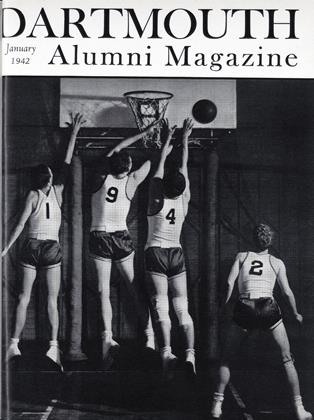DO YOU REMEMBER BACCALAUREATE? It was the most solemn of the Commencement events. It was the most impressive of anything on the week-end program because a religious service strikes harder and deeper than any other experience that men have.
There was the long line of black-robed seniors, when you and I marched to Baccalaureate. The chapel, thronged with parents, held two blocks of empty chairs, awaiting entry of another procession of graduates. In the singing and the deep voices joined in the Lord's Prayer you felt the strength of spirit of the men, your classmates, around you. Bonds of friendship, devotion to Dartmouth, fine instincts for living according to the teachings of Christ —these things were- made sacred by that hour in the chapel together.
At the Christmas Carol Service last month, just before the College broke up for the vacation, there were no caps and gowns. It was a December evening—frosty, dark, still with new snow. The old chapel, candle-lighted by two huge candelabra, awaited the entry of a whole student generation. The procession began at Topliff, at Commons, at Hitchcock, on Webster Avenue. The lines joined and flowed through blacked-out portals into a house of worship, as a murmuring river gathers hill streams and enters the vast, deep reaches of the sea.
It seemed as though the whole student body was there. (We shouldn't have intruded—it was a service for students only, led by the President of the College. It came a few days after declaration of war.)
O come, all ye faithful, joyful and triumphant;O come ye, O come ye to Bethlehem:Come and behold Him, born the King ofangels:O come, let us adore Him,O come, let us adore Him,O come, let us adore Him,Christ the Lord.
That crowd, which was the living, youthful Dartmouth, sang in exultation. Never was singing more impressive. There in the chapel was peace. There was Prexy whom they listened to with reverent respect and affection. He told them: "Once upon a time a child was born. An unquenchable flame was born in that child. It was in the person of Christ that standards were established that make possible a democratic way of life. The spirit of Jesus is essentially the spirit of Democracy" ....
"The Lord bless you and keep youAnd make his face to shine upon you....."
The glee club started softly singing the carol response to the benediction, "SilentNight." The student body joined in. Dimly lighted by twinkling candles the walls of the old chapel saw Dartmouth turn to religion in a time of crisis, and heard the College unite in a moving song of prayer.
It was Baccalaureate at Christmas.
"I'm proud as hell of democracy, and mycountry today. Can't say I was exactly enthusiastic last week, or last year, but todayI am. My country didn't want war, andwas honestly trying to avoid it, or at leaststall it off. My country was tricked .... shewas treating Japan like a man, civilized,honest. That country stabbed mine whenthere was no hint of such action. My country got mad—l liked the speed and spiritwith which my country collected itself, declared war. I like my country and I thinkit is absolutely the best and only good government in the world, and I am willing to fight for it."
IT WAS IN THESE TERMS that one undergraduate reacted to the news of December 7 when Japanese bombs fell on Pearl Harbor. If the papers written by students of Prof. Edmund H. Booth '18 in English 19 can be taken as a sample of student opinion, the above by James S. Carter '44, and abstracts of other undergraduate opinion composed in that class exercise that are printed at the end of these notes, a unity and oneness of spirit was created within an hour.
Some boys left College. Jerry Tallmer and A. A. Fanelli, both seniors and respectively editor-in-chief and editorial chairman of The Dartmouth were accepted as recruits in the U. S. Army within a few days after war was declared. Others submitted their resignations but there was a predominant feeling in the student body that it was better to wait until definite demands for men are made clear. The Dartmouth pointed out: "Entrance into training may be delayed so that the present semester can be completed, perhaps the year. Under such circumstances it would be unwise not to complete as much of the year's work as possible."
Impact of Crisis and War on the College
IN THE FALL OF 1918A detachment of the Student Army Training Corps of the Dartmouth of 23 years ago isshown marching past the Inn corner. (Note the old watering trough at left.)
 View Full Issue
View Full Issue
More From This Issue
-
 Class Notes
Class Notes1936*
January 1942 By EDWARD T. CHAMBERLAIN JR. -
 Article
ArticleSpeeded Reading
January 1942 By ROBERT M. BEAR asst. -
 Article
ArticleWar Measures Adopted
January 1942 -
 Article
ArticleThe Undergraduate Chair
January 1942 By Craig Kuhn '42. -
 Class Notes
Class Notes1911*
January 1942 By PROF. NATHANIEL G. BURLEIGH -
 Class Notes
Class Notes1937*
January 1942 By DONALD C. MCKINLAY
The Edrror.
Article
-
 Article
ArticlePROFESSOR OF EDUCATION APPOINTED
March, 1915 -
 Article
ArticleSENIORS DECIDE TO PAY TEN DOLLARS YEARLY TO COLLEGE
June 1921 -
 Article
ArticleEXECUTIVE COMMITTEE REPORT
JULY 1931 -
 Article
ArticleWe are pleased . . .
February 1962 -
 Article
ArticleOnscreen Philosophy
APRIL 1994 -
 Article
ArticleSouthwest Florida
JUNE 1977 By EDWARD S. McKINLAY '42



